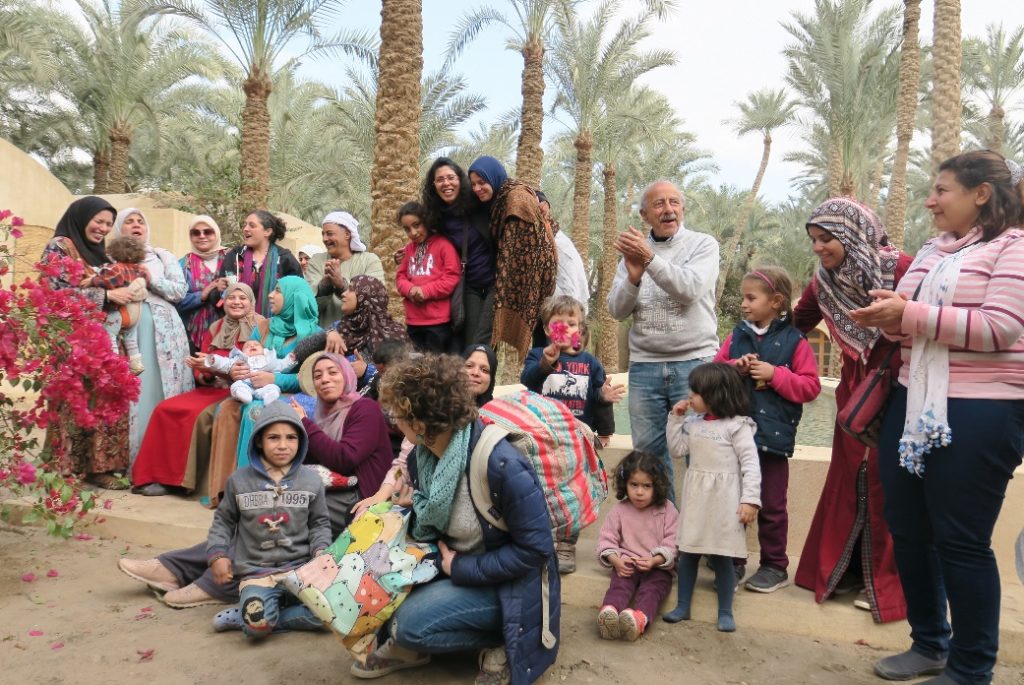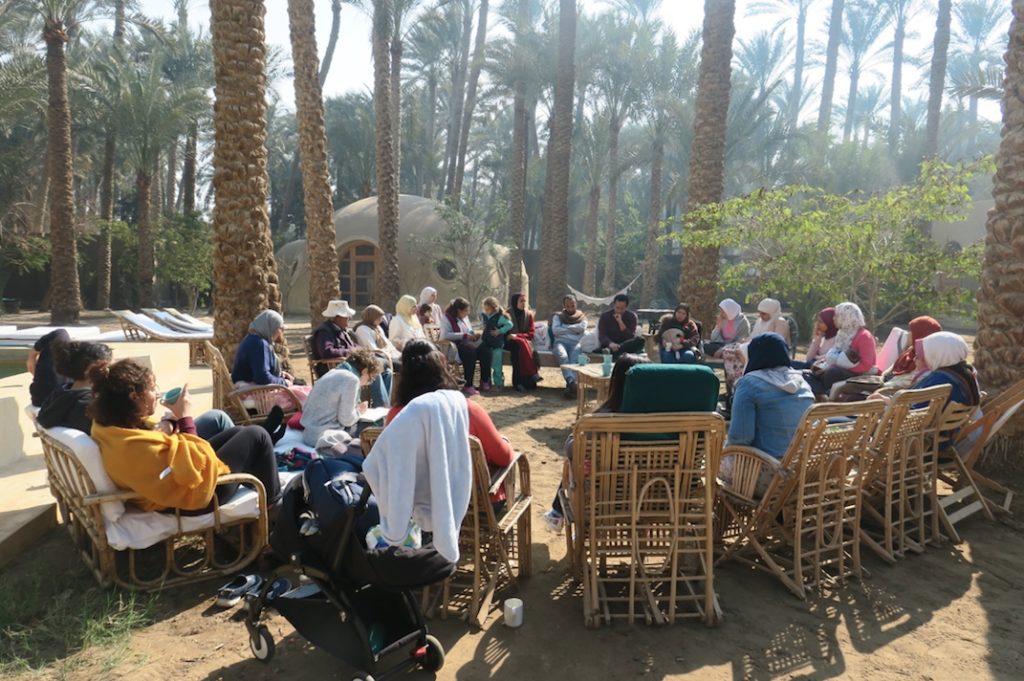Institutions are needed in a very limited way – at the level of the branches and what is visible. At the roots, where life is constantly regenerated (but less visible), institutions are usually harmful. Mujaawarah nurtures the roots; nurtures people at personal and communal levels; it is a tool in people’s hands. Mujaawarah is formed by people willingly; there is no other requirement.

Dahshour – Egypt. February 2019 .
The vision I work with is the twin of mujaawarah and wellness: mujaawarah as the ‘adobe’ in building community and wellness as the governing value. Forming a mujaawarah and meaning of wellness are the responsibility of people, in harmony with their context, convictions, and conversations. Wellness in the roots is nurtured by three soils: earth-nature soil, culture-knowledge-spiritual soil, and community-economic soil. In Arabic, we use the same word for telling stories and watering plants (narweeنروي) which means ancient Arabs saw the connection between nurturing minds/ thinking and nurturing bodies/ plants.
“What we seek in mujaawarahs is simple but deep at the roots, and builds on what all people can contribute to.”
A main virus in modern times has been the mother tongue which entered our minds, thoughts, and language and corrupted them and rendered mother’s tongue worthless. The two tongues seem to be related but in fact they are worlds apart. The first is fabricated (as manifested by textbooks, institutional terms, and academic categories) – a statue that needs to be pulled down and thrown away; the second refers to living languages (as manifested in stories, conversations, poetry, and literature). Meanings in the first, claim to be single and universal while in the second, meanings are literally limitless. The main constituent of the first is the alphabet; of the second, stories (bayaan which professes what brews or matures within the person, which could appear in words, art, songs, hugging…). The soul of mujaawarahs is hospitality, generosity, dignity, hope, respect, abundance, patience, and having faith in nature and people. They start with cleansing us of viruses and poisons that come in the form of food, words, perceptions, evaluation, and the belief that there is a single universal path for learning and progress, and single universal meanings for words. Healing from them is crucial in regaining our sanity and well-being. When a body gets sick, a good way to start healing is fasting. Same with the mind: we need to fast against using institutional terms and academic categories, and start using words that have multiple meanings.
What we seek in mujaawarahs is simple but deep at the roots, and builds on what all people can contribute to. My experience with mujaawarahs at a ‘national’ level started in 1971 for ten years where I was involved in activities that included voluntary work movement and encouraging students to form math and science clubs in schools. Later, it included establishing Tamer Institute in 1989 during the first intifada; then the Arab Education Forum and Qalb el-Umoor, and now with JOHUD centers around Jordan (along with other groups, mainly in Jordan and Palestine). The medium in all is the mujaawarah; and the medium within each mujaawarah are the people who form it and who seek to make sense of their experiences and lives. We need to stop being copies and parrots of any one and, instead, reclaim words and meanings that are rooted in life and full of respect, wisdom, hospitality, love, patience, humility, and plurality.

Dahshour – Egypt. February 2019 .
Dominant knowledge in relation to words and thought are like dominant foods in relation to plants and the body: both corrupt the spirit of regeneration which characterizes life most. Personal stories that do not use institutional terms nor academic categories are our tools in creating meanings at the roots. Rumi said: let the meaning, not the sound, rise from you. What causes the flower to bloom and open is rain, not thunder.
In today’s world, as I mentioned earlier, we live two languages: fabricated languages and living languages. Search e.g. belongs to living languages, research to institutional ones; learning to living, education to institutional; yuhsen to living, evaluation to institutional; books to living, textbooks academic books to institutional; ahaali (people-in-community) to living, citizens to institutional; life journey to living, CV to institutional; changing oneself to living, changing others and communities to institutional…
Mujaawarahs are closer to ‘animal skin bags’ than to jars. Bags take the form according to the movement of the water; jars control the form that the water takes. Institutions are like jars; mujaawarahs are like skin bags.
“Personal stories that do not use institutional terms nor academic categories are our tools in creating meanings at the roots.”
This story can help clarify the ‘philosophy’ of the mujaawarah. In the second semester of the school year 2011-12, I worked with 7th grade students at the girls school in Shufaat refugee camp near Jerusalem. We did 2 things: we started tilling the soil in the garden around the school in order to plant vegetables, then later with 8 girls in that class who expressed unhappiness with their weight and wanted to do something about it. I said, “let’s meet every Saturday and everyone of you keeps details of what she ate during the past week, and tells the group what she ate and what she wants to change.” I never told them what to eat or not to eat; the responsibility is theirs. However, we could not continue for long because Israeli soldiers kept entering the camp. I said, ‘now you can continue on your own; you have all what you need.’ I went back in 2017, for a visit, and was so happy to see a garden flourishing by young children and their energetic teacher. I was also happy to see a placard on a wall in the school that has Imam Ali’s statement which stresses the worth of a person is what s/he does well, beautiful, useful, respectful, and giving. Girls refer to it any time a teacher labels them as failures.
Rumi said, ‘Maybe we are searching among branches for what only appears in the roots’. This is so true about the modern world where – by design – we stay among the branches and leave the roots to rot. In mujaawarahs, we focus on the roots. A main manifestation of this is reminding every person that s/he is a source of meaning and understanding – what I refer to as ‘democracy of meaning’ (the deepest form of democracy).
